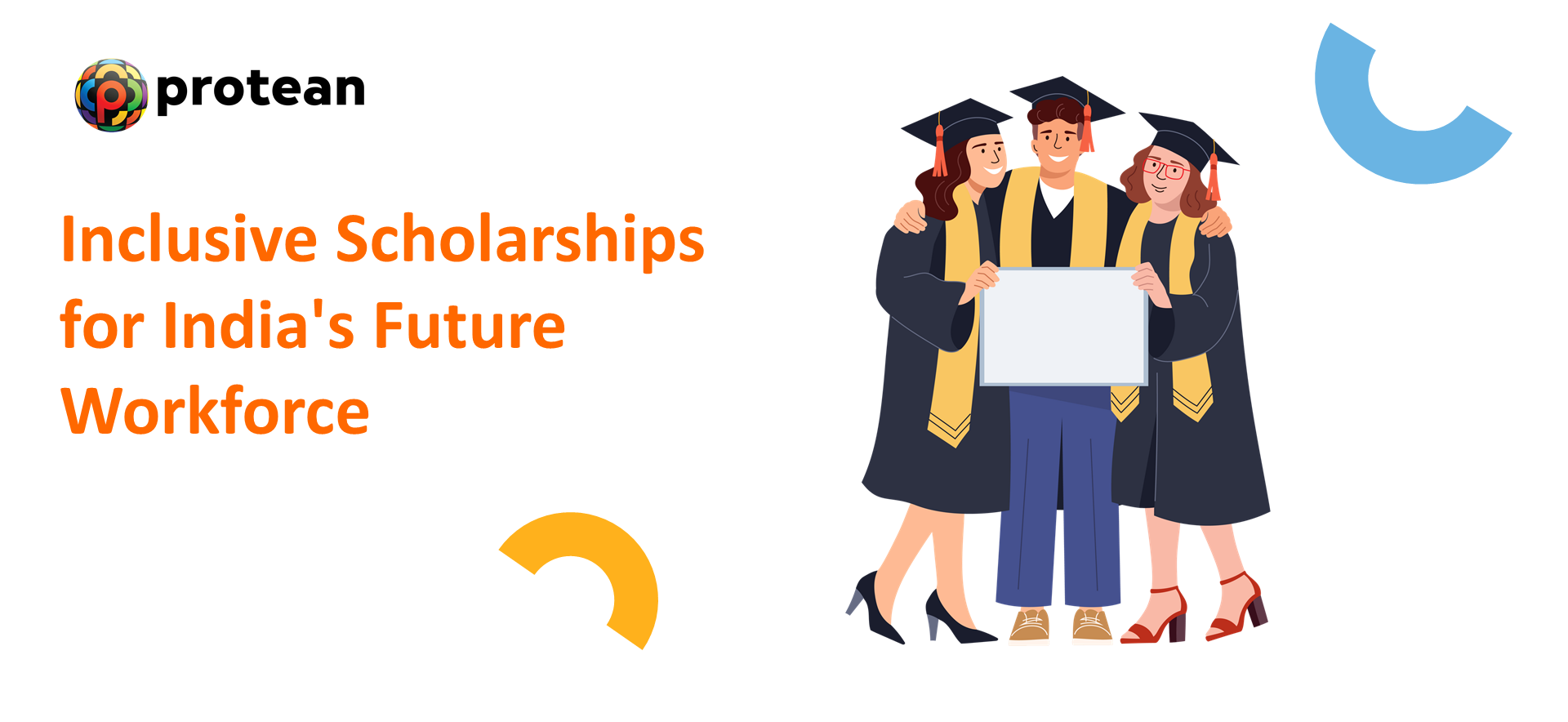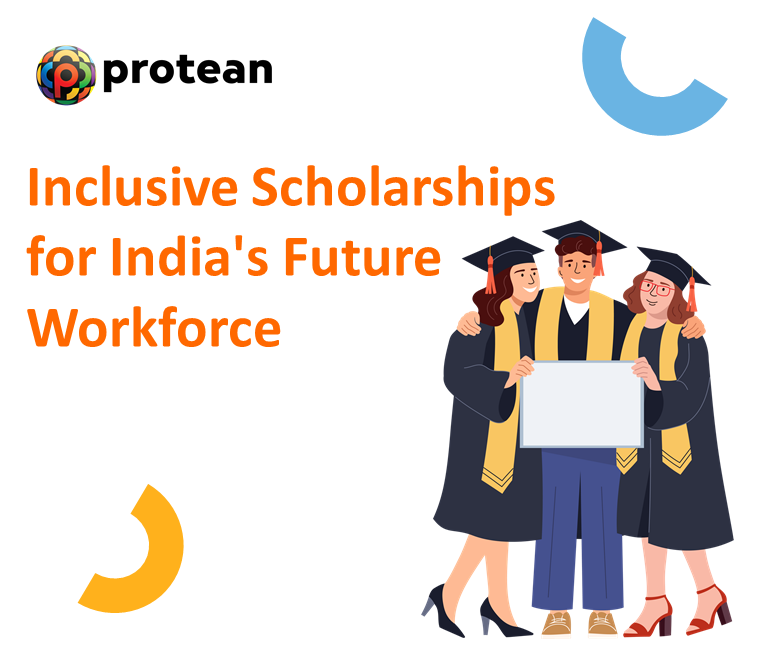India's economy is on a high-growth trajectory, but its future success is tied directly to the principle of inclusive growth—ensuring that every citizen has an equal opportunity to contribute. When it comes to education, this inclusivity faces a silent, significant challenge: The Overlooked Scholarship Gap.
While Corporate Social Responsibility (CSR) funding for education is a priority, with total CSR spending in India crossing ₹35,000 crore in the latest fiscal year, most scholarship programs still adhere to a "one-size-fits-all" model. This model often misses a crucial demographic: learners who face both financial strain and accessibility challenges due to diverse learning, visual, hearing, mobility, or other unique access needs.
It is estimated that India has over 2 million learners with diverse learning and access needs. These students face a double barrier to accessing and completing their education. Despite this clear need, only a very small fraction of India’s burgeoning CSR budget is allocated to inclusion-focused education initiatives. This gap represents one of the strongest, yet most untapped opportunities, for high-impact education CSR.
Why Inclusive Scholarships Drive Outsized Impact
Inclusive scholarships are not just about charity; they are a strategic investment in long-term human capital development. By specifically designing programs for learners with diverse needs, corporates can ensure their funding provides stability and support where it is needed most.
Such targeted support can:
Strengthen Academic Continuity
Financial and logistical support significantly improves academic continuity, helping to reduce high dropout rates and ensuring learners complete their degrees or skill courses. According to UNICEF, only a fraction of learners with diverse needs successfully transition into higher education, meaning even a small number of scholarships can have an outsized impact on reversing this trend.
Support Financial Stability
The cost of education, coupled with the expense of assistive technology or accessible accommodation, is often prohibitive. Inclusive scholarships support financial stability for the student and their family.
Build Confidence and Independence
Removing financial and access hurdles allows students to focus on their studies, build confidence, and prepare for a career, fostering long-term independence.
Generate High-ROI CSR Outcomes
Companies seek measurable impact. By targeting a severely underserved group, the impact per rupee spent—in terms of retention, skill acquisition, and eventual job placement—is notably high.
The Employability Angle
For CSR heads and HR leaders, the most compelling argument for inclusive scholarships lies in their potential to create a diverse and job-ready talent pool.
India’s overall employability rate currently stands at approximately 54.81%. This indicates a persistent gap between academic qualifications and the skills demanded by the industry. Learners with diverse abilities, however, often possess strong analytical, cognitive, and creative strengths. The true barrier is not capability, but access and opportunity.
When a scholarship is coupled with targeted skill modules, the result is a direct pathway to employment. CSR spending moves from being a donation to becoming a strategic pipeline for inclusive hiring and enhanced workforce diversity. By funding the upskilling of this talent pool in digital, service, or creative sectors, companies are preparing for the future of work while simultaneously strengthening their own Diversity, Equity, and Inclusion (DEI) goals.
Designing an Intentional, Inclusive Scholarship Model
Inclusion doesn’t have to be complicated; it must be intentional. An effective inclusive scholarship model moves beyond simple fee reimbursement to cover the specific, additional needs of the learner.
Corporates should consider funding a holistic package that may include:
Assistive Tools and Technology
Providing not just financial aid, but the equipment necessary for learning, such as screen readers, hearing aids, adaptive hardware, or specialised software.
Accessible Logistics Support
Covering additional costs for travel, accessible hostel rooms, or specialised transportation for learners who require accessible environments.
Inclusive Digital Learning
Ensuring that digital course materials and skill-building modules are designed with accessibility features compliant with global standards.
Specialised Partnerships
Collaborating with Non-Governmental Organisations (NGOs) that have deep, specialised expertise in inclusive education and rehabilitation.
Simplifying Inclusive CSR at Scale with Technology
The move toward more complex, inclusive programs raises a practical concern for corporate foundations: how to manage custom categories, ensure transparency, and measure outcomes effectively. This is where scalable digital platforms can act as a crucial enabler.
A robust technology solution, like Vidyasaarathi, is designed to support corporates in running transparent, multi-stakeholder scholarship programmes at scale. Such a platform allows a corporation to:
- Customise Categories: Easily host and manage custom scholarship categories specifically for learners with diverse needs.
- Ensure Transparency: Facilitate clear beneficiary verification, direct-to-beneficiary fund transfers, and real-time tracking of disbursement.
- Simplify Measurement: Provide corporate dashboards that instantly show who benefited, how, and what educational/employability outcomes were achieved.
This approach makes launching, managing, and measuring an inclusive scholarship program simple and effective, addressing the monitoring gap (where 72% of NGOs lack structured monitoring systems).
The Time for True Inclusion is Now
With CSR spending on a strong upward trend, crossing the ₹35,000 crore mark, the focus must shift from merely meeting the 2% compliance mandate to achieving genuine societal transformation. True inclusion remains the missing piece.
By strategically designing scholarships for students with unique support needs, corporates can ensure that no learner is left behind. Inclusive CSR today is the foundational investment required to build an inclusive workforce tomorrow. This is not merely an act of philanthropy; it is the necessary evolution for India’s next decade of high-impact education CSR.
India’s strength lies in the potential of its young population. By proactively supporting learners who face both financial and accessibility barriers, corporates can create life-changing, measurable impact—and with scalable digital systems, this inclusion is more simple, transparent, and achievable than ever before.
Frequently Asked Questions - Inclusive CSR Scholarships
Q1: What is an inclusive CSR scholarship?
An inclusive CSR scholarship is a program specifically designed to address both the financial needs and the additional access/support needs (e.g., visual, mobility, learning differences) of students, moving beyond a "one-size-fits-all" approach.
Q2: Why focus on learners with diverse access needs?
These learners face double barriers—financial strain plus accessibility challenges—which severely limits their transition to and completion of higher education, representing a high-impact, under-addressed opportunity for CSR.
Q3: What can an inclusive scholarship cover?
Beyond tuition, it can cover the costs of assistive technology (screen readers, adaptive devices), accessible travel/hostel support, and specialised, inclusively designed skill-building modules.
Q4: How does this help corporate employability?
It builds a direct pipeline of job-ready, skilled talent from an underserved community, strengthening the company's workforce diversity and aligning with long-term inclusive hiring goals.
Q5: How can corporates ensure the program is transparent and scalable?
By leveraging digital platforms that can host custom categories, manage real-time verification and direct-to-beneficiary fund transfers, and provide clear impact dashboards for easy measurement and reporting.

